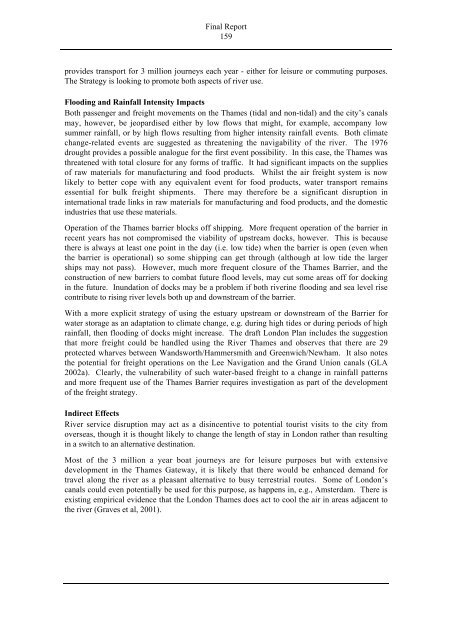London scoping - ukcip
London scoping - ukcip
London scoping - ukcip
Create successful ePaper yourself
Turn your PDF publications into a flip-book with our unique Google optimized e-Paper software.
Final Report<br />
159<br />
provides transport for 3 million journeys each year - either for leisure or commuting purposes.<br />
The Strategy is looking to promote both aspects of river use.<br />
Flooding and Rainfall Intensity Impacts<br />
Both passenger and freight movements on the Thames (tidal and non-tidal) and the city’s canals<br />
may, however, be jeopardised either by low flows that might, for example, accompany low<br />
summer rainfall, or by high flows resulting from higher intensity rainfall events. Both climate<br />
change-related events are suggested as threatening the navigability of the river. The 1976<br />
drought provides a possible analogue for the first event possibility. In this case, the Thames was<br />
threatened with total closure for any forms of traffic. It had significant impacts on the supplies<br />
of raw materials for manufacturing and food products. Whilst the air freight system is now<br />
likely to better cope with any equivalent event for food products, water transport remains<br />
essential for bulk freight shipments. There may therefore be a significant disruption in<br />
international trade links in raw materials for manufacturing and food products, and the domestic<br />
industries that use these materials.<br />
Operation of the Thames barrier blocks off shipping. More frequent operation of the barrier in<br />
recent years has not compromised the viability of upstream docks, however. This is because<br />
there is always at least one point in the day (i.e. low tide) when the barrier is open (even when<br />
the barrier is operational) so some shipping can get through (although at low tide the larger<br />
ships may not pass). However, much more frequent closure of the Thames Barrier, and the<br />
construction of new barriers to combat future flood levels, may cut some areas off for docking<br />
in the future. Inundation of docks may be a problem if both riverine flooding and sea level rise<br />
contribute to rising river levels both up and downstream of the barrier.<br />
With a more explicit strategy of using the estuary upstream or downstream of the Barrier for<br />
water storage as an adaptation to climate change, e.g. during high tides or during periods of high<br />
rainfall, then flooding of docks might increase. The draft <strong>London</strong> Plan includes the suggestion<br />
that more freight could be handled using the River Thames and observes that there are 29<br />
protected wharves between Wandsworth/Hammersmith and Greenwich/Newham. It also notes<br />
the potential for freight operations on the Lee Navigation and the Grand Union canals (GLA<br />
2002a). Clearly, the vulnerability of such water-based freight to a change in rainfall patterns<br />
and more frequent use of the Thames Barrier requires investigation as part of the development<br />
of the freight strategy.<br />
Indirect Effects<br />
River service disruption may act as a disincentive to potential tourist visits to the city from<br />
overseas, though it is thought likely to change the length of stay in <strong>London</strong> rather than resulting<br />
in a switch to an alternative destination.<br />
Most of the 3 million a year boat journeys are for leisure purposes but with extensive<br />
development in the Thames Gateway, it is likely that there would be enhanced demand for<br />
travel along the river as a pleasant alternative to busy terrestrial routes. Some of <strong>London</strong>’s<br />
canals could even potentially be used for this purpose, as happens in, e.g., Amsterdam. There is<br />
existing empirical evidence that the <strong>London</strong> Thames does act to cool the air in areas adjacent to<br />
the river (Graves et al, 2001).

















